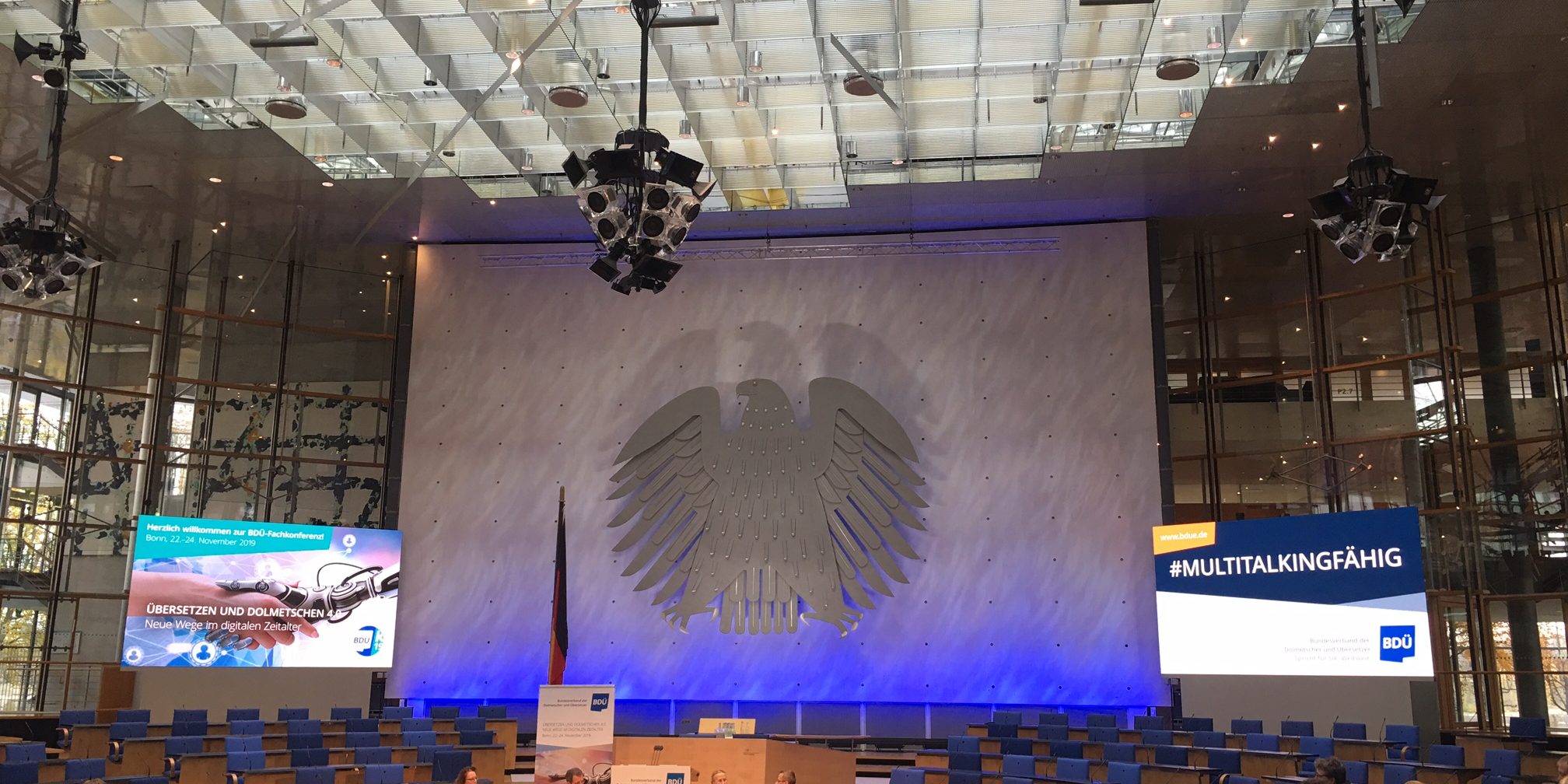My closing statement at the 2019 BDÜ conference
The Conference of the German translators association BDÜ at the World Conference Center (the former site of the German parliament) in Bonn on 22-24 November 2019 was a well-organized and insightful 3-day event. More than 1,000 participants from over 20 countries met to network and exchange views about developments on the market. The conference theme was Translation and Interpretation 4.0, with a focus on artificial intelligence and neural machine translation (NMT) and how that is transforming the language-services landscape.
Several presentations offered advice on added skill-sets that translators can offer to maintain a competitive edge in view of these changes. There were even sessions on taking better care of oneself (I missed those though, being all busy and such). In the final round of discussions in the impressive plenary hall (where the parliamentarians used to sit and discuss!) I presented a statement in closing that I am passing on here, since I got so much positive feedback:
Human translation experts will get to shine again
Despite all the challenges we heard about, and despite the complaints how hard it has become to survive as a translator in the face of continuous advances in NMT systems, I consider NMT a blessing in disguise – a historic opportunity that we should not pass up on.
Why?
Human translators whose performance and deliverables don’t significantly surpass those provided by machine-translation systems will soon be replaced by those systems and hence, disappear for good. Consequently, the market will be cleansed from the many poorly qualified or poorly paid translators whose sub-par work has damaged the reputation of an entire profession over the last decades. Finally the time has come for the highly qualified specialists among us to prove how much valuable multilingual and multicultural communication support we can offer our clients. Finally there is a chance for the best of us to be adequately recognized as the experts that we are.
Process-heavy jobs will go to agencies
NMT will ensure that jobs which are heavily process-focused and automatable will be placed with agencies that have the clout and money to invest in process-heavy solutions. Texts that require a nimble approach and deep knowledge of contexts that no machine will ever have by design, will be handled by human communication experts guiding and advising their clients. This will ensure a healthy separation of expertise and make it easier for clients to decide when to go for larger-sized agencies, and when a human expert is the better choice.
In a nutshell
We should embrace neural machine translation as a historic opportunity to re-instate visibility for the expertise and added value that human translators and transcreators offer their clients. It is up to all of us to make intelligent use of that opportunity, with support from strong and active professional associations around the world.
Let’s get to work, everyone!
* * *
NOTE:
It has been brought to my attention that, in the above post, I should also include another point I made in my conference statement. It addressed the question of “quality.”
Quality: good or bad, who’s to say?
Like always, there was also a lot of talk at the conference about how human translators are able to deliver work that’s of “higher quality” than NMT. But how do you assess “quality” in translation? Every translation should be correct in every respect, that’s a minimum requirement and not “quality”. In my statement, I presented my personal take on this:
Quality in translation is a concept that is sometimes hard to nail down. I recommend that quality be measured by how well a target-language text fulfills the client’s expectations, as laid down in a list of criteria (what we call a “client brief” in marketing parlance). The human translation expert should deliver a text together with a document explaining how the solutions and approaches she chose tie in with that brief. This is especially important and relevant when clients cannot judge the target text themselves.
And it’s especially relevant when it comes to texts that are meant to engage, inspire, and motivate. Texts that require the skills and expertise of a transcreator.



Thank you for your interesting summary Nina. I would have loved to have attended the conference. It certainly feels as if we are approaching a tipping point in the translation industry. I see MT as an opportunity and not a threat. I don’t want to translate tediously repetitive content – let the machines do that. As a sentient being, I can empathise and understand context and the purpose of a text. I can think laterally and be creative. I can engage with the client and deliver a proper service where I can add value. As a profession, we need to be honest about what our clients are getting out of us. How are we really offering value for money? What can we offer beyond translation? I sometimes feel weighed down by a sense of foreboding among my colleagues. It’s hard not to feel exploited by many of the agencies, however, we need to be strong and fight hard for our profession. My personal strategy is to find out as much as I can about the technology (know thy enemy) and to develop my knowledge and skills (customer engagement, copywriting etc.) as much as possible. It’s overwhelming at times – good job I’m an eternal optimist
Thank you, Sarah, for your comments. Very relevant. I hope that many colleagues feel the same way.